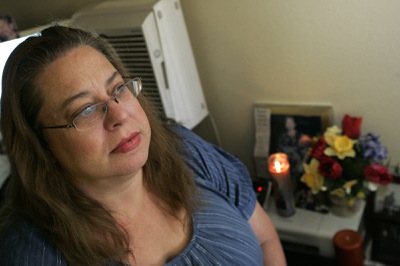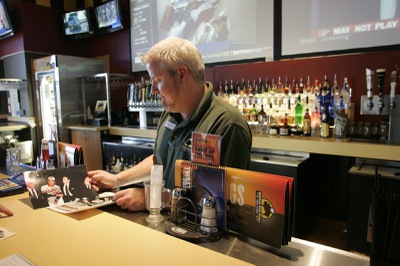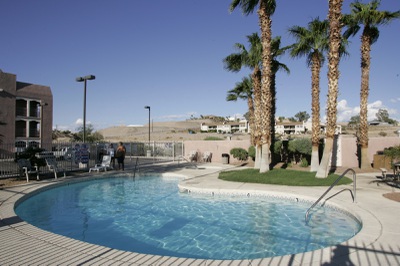It was just three weeks ago when my phone rang and a loud, friendly-sounding voice with a pronounced Hispanic accent came on the line.
Audio Clip
- Cindy Muir, Todd Cruz's fiance, describes Cruz.
-
Beyond the Sun
“Hey, Ron, this is Todd Cruz.”
Todd Cruz ... Todd Cruz ... I did a quick scan of my memory bank, trying to place the name.
I told the caller the only Todd Cruz I know is the old ballplayer.
“That’s me,” he said with a cackle, delighted that somebody remembered.
Todd Cruz, the old ballplayer, said he had just returned from the 25-year reunion of the Baltimore Orioles’ 1983 World Championship team at Camden Yards. He played third base on that team. A young whippersnapper named Cal Ripken Jr. played shortstop. Don’t ask me why, but I remember a journeyman outfielder from Albuquerque named Tito Landrum hitting a home run in the 10th inning to beat the White Sox in the American League Championship Series. So I mentioned that to Cruz, who laughed some more.
“Yeah, but who’d he hit it off?”
“Britt Burns.”
Todd Cruz, the old ballplayer, laughed louder. He was stunned that somebody would remember that.
We talked for about 10 minutes that day and on the next two days. Cruz said he was living in Bullhead City, Ariz., just across the river from Laughlin, and was interested in signing autographs or public speaking — for a fee. Actually, he didn’t mention the fee.
But I sensed he could use the money when he mentioned he was signing autographs at a carwash in Bullhead City. I asked about the major league pension. “It’s only $22,000 a year,” he said. “I’ve got an ex-wife, and she takes half.”
The day after that, I received a packet in the mail. Inside were photos of Cruz doing baseball stuff and posing with his baseball buddies — Cal Ripken Jr. and Ken Griffey Jr. and Earl Weaver and “Mr. Cub,” Ernie Banks. There was a resume listing his professional baseball stops — Phillies, Royals, Angels, White Sox, Mariners, Orioles — and his Hollywood credits — “Naked Gun,” “Tequila Sunrise,” “A Talent for the Game,” “L.A. Law,” “The Young and the Restless.”
He also included something called the Todd Cruz credo — baseball words for youngsters to live by. And there was a cover letter — all of it autographed.
“I have your number, you have mine,” Cruz wrote about the interview on which I was still wavering. “LET’S DO THIS!”
It was signed, “Your new buddy, Todd Cruz.”
My curiosity was aroused. I had to know how a guy with a World Series ring winds up in Bullhead City, Ariz., signing autographs at a carwash. So we agreed to meet, on the Wednesday after Labor Day.
On the Tuesday after Labor Day, Cruz went for a swim at the apartment complex where he lived.
A short time later, they pulled his lifeless body out of the water.
Todd Cruz, the old ballplayer, my new buddy, was dead.
•••
Good field, no hit. That, in a nutshell, was the scouting report on Todd Cruz.
He had some pop in his bat but a small hole in his swing. But he had the range of Frankie Valli and a cannon for an arm. The Phillies drafted him in the second round out of high school in 1973. Five years later — Sept. 4, 1978 — he made his major league debut.
Cruz spent six seasons in the bigs, playing in 554 games with a career batting average of .220. Baseball-Reference.com compares his career to those of John Boccabella, Chris Bando, Rube Walker, Jerry McNertney and Lenn Sakata. In other words, he wasn’t a great ballplayer, at least by major league standards, but you try hitting Bert Blyleven’s curveball.
Cruz’s best year, statistically, was 1982, when he hit 16 homers and drove in 57 runs, both career highs, for the Mariners.
His best year, in every other way, was 1983, when the Orioles purchased his contract in late June and he became their starting third baseman for the rest of that championship season.
“Todd was the perfect piece for our team,” Joe Altobelli, the manager of the 1983 Orioles, told the Baltimore Sun. “Boy, oh boy, did he fit our infield. He joined us on the road in Detroit, a .190 hitter, and hit two home runs in his first game.
“Having been a shortstop, he had great range at third base. I can still see him in the World Series when somebody hit a shot in the hole and Todd turned a double play.”
Cruz was proud of his defense in an era when it was emphasized more than it is today. He had four hits in the 1983 playoffs and World Series but all he wanted to talk about was his glove.
“I handled 16 chances without an error” in the World Series, he said proudly.
Actually, it was 18. But who’s counting web gems when you’re getting measured for a World Series ring?
•••
Todd Cruz was born on Nov. 23, 1955, in Highland Park, Mich. But he grew up in southwest Detroit, in a neighborhood called Mexicantown, owing to its predominantly Hispanic population. Today, Mexicantown is one of the Detroit neighborhoods that is growing, with new housing and business opportunities leading to a revitalized economy.
It wasn’t exactly like that when Cruz was growing up.
The streets were meaner then, and home, at least in Cruz’s case, wasn’t exactly sanctuary, either.
“His mom and dad both had drinking problems,” said Ignacio Gonzalez, Cruz’s history teacher at Detroit’s Western High School, the man he’d affectionately called Uncle Zig since he and Gonzalez’s son, David, sped around the block on their tricycles. “Early on, when Todd was 6, his mom and dad separated. Todd lived with his mom, sometimes with his dad ... they seemed to move every nine or 10 months.
“He had a lot of instability in his young life ... but he was a well-behaved little kid. No problems at all.”
Well, there was a small problem when Todd was a senior in high school. Gonzalez was his homeroom teacher and said Cruz started showing up late to class and often appeared tired and haggard.
It turned out he was staying up late and sometimes all night, shining shoes at the Michigan Central Depot train station so he and his mom would have a little extra money to live on.
“I cut him some slack because of that,” said Gonzalez, who can still recall Cruz’s greatest high school hits as if they happened yesterday.
After high school, Cruz married Isabel Gonzalez, his high school sweetheart. (They had two sons before they divorced. Dario is doing time for murder in Michigan. But Thaddeus came to retrieve his father’s ashes.)
But Cruz remained devoted to his mother and still was playing baseball when she died. Gonzalez sent him a letter, to console him, which Cruz posted in his locker, a reminder of the two people nearest and dearest to him.
Gonzalez said Cruz’s father died years later. Todd, who was living in California then, came home for the funeral. He stayed with Gonzalez. He didn’t leave for five weeks.
“He was drinking too much,” Uncle Zig said. “I thought he was going to fry his liver, just like his dad.”
•••
One of the photos Cruz sent — and signed — is of him shaking hands with President Reagan, on Opening Day 1984. Baseball Commissioner Bowie Kuhn and Orioles owner Edward Bennett Williams also are in the shot.
By the end of that season, Cruz’s major league career would be over.
Trying to keep the dream alive, he played Class A ball for the Miami Marlins of the Florida State League and the San Jose Bees and San Bernardino Spirit of the California League and with Leon of the Mexican League. He did win one more championship — with the St. Petersburg Pelicans of the short-lived professional senior baseball league in Florida. After that, there were brief stops in Bologna, Italy, and with the Salinas Spurs of the California League.
By 1991, the dream was over.
The entry under “1991-Present” on the resume he sent is alarmingly short — card shows, world traveling teams, youth and adult clinics, coaching, charity work. That’s it. All baseball-related. All short-term.
Todd Cruz wasn’t a baseball player first and foremost. He was a baseball player, period.
He made a lot of money playing ball — more than $5 million. The Mariners paid him $2.3 million in 1982, which was a decent wage in those days. But if there was one thing Cruz did better than throw out a runner from the edge of the outfield grass, it was spend money. On you and him.
“He’d give somebody the shirt off his back,” said Cindy Muir, Cruz’s long time girlfriend/fiancee with whom he lived in Colton, Calif., and later, in Bullhead City. “He just loved everybody, anybody to talk to, anybody who would walk by. He used to bring homeless people home, feed ’em and give ’em clothes, whatever. ‘Hey, you wanna spend the night?’ — I’d get so mad.
“We’d go to a grocery store and he’d drive me up the wall. It would take us two hours to get two things because the man is stopping everybody in the store, talking, and the next thing you know, we’ve got another friend.”
Cruz and Muir moved to Bullhead City in October, to be closer to Muir’s kids and because the cost of living is much lower than in the San Bernardino area. They rented a modest one-bedroom apartment off the main drag that follows the Colorado River on the Arizona side.
They had an arrangement — Todd paid the rent; Cindy, who was a cashier at the Wal-Mart across the street, took care of the extras.
“It was supposed to be a half-and-half thing. But the extras are a lot when it comes to Todd and his beer,” she said with a chuckle.
Cruz wasn’t particularly close with his friends in Bullhead City, but he had a lot of them. His hangouts were the downstairs bar at the Edgewater in Laughlin and Buffalo Wild Wings in Bullhead City, where he’d show up in his No. 10 Orioles jersey with a bucket of baseballs. Autographs were free, but a signed ball would cost a donation — whatever you could spare.
Robb Gambrell, the manager of the bar and restaurant, sensed that Cruz was having money problems, so he’d set up a table for him to sign autographs.
“Just a nice guy,” Gambrell said. “He’d sit out there with the kids, show them how to hold the bat. He seemed real happy.”
Most of the time Cruz treated the bar as if it were the batting cage at Memorial Stadium, greeting old friends and introducing himself to new ones, as if they were rookies just up from Rochester.
“I shared a beer or two with him, I’m not going to lie to you,” said Chris Calahan, a Wild Wings bartender whose wry smile suggested he was slightly underreporting their beer consumption. “He always wanted to talk baseball. He told me he wanted to coach Little League, that he wanted to be involved with baseball and kids, to show ’em how much fun it was.”
Gambrell said Cindy would drop Cruz off and pick him up. Eventually, they’d wind up in the tiny confines of the Marble City Apartments — “Todd called it our little dungeon,” Muir said — where they’d watch baseball on the high-definition TV that barely fit in the bookcase.
But if there wasn’t a game to watch, Cruz would get restless. Then he’d go down to the pool for a swim. That’s what happened on the day after Labor Day. A friend was supposed to drive him down to Phoenix for the Diamondbacks-Cardinals game. But when he didn’t call, Cruz told Muir he was going swimming. She decided to take a nap.
She awoke to a loud rap on the door.
“I’m goin’, ‘Todd, answer the door,’ ” Muir said. “That’s when the guy hollered in: ‘There’s been an accident down at the pool.’ ”
•••
Nobody knows for sure what killed 52-year-old Todd Cruz.
“He was in the pool, talking to the guys down there,” Muir said. “He said, ‘Gimme another minute, let me take another dunk, and we’ll go to the Edgewater.”
Larry Tunforss, a spokesman for the Bullhead City Fire Department, said eyewitnesses told paramedics that Cruz ducked underwater at the tiny kidney-shaped pool, where the deep end goes to only six feet, and began to hold his breath.
“Like he was goofing off,” Tunforss said.
There was no thrashing, so sign of distress. But when onlookers sensed that Cruz had been underwater too long, they pulled him out of the pool.
A witness performed CPR. So did paramedics upon arriving. Cruz was transported to the hospital, but it was too late.
“I could tell he wasn’t there,” Muir said, her voice trailing off as she added another Pall Mall menthol butt to the six already in the ashtray.
“They tried some more at the hospital. But he was underwater too long.”
An autopsy to determine the cause of death is being conducted. Muir said doctors think Cruz probably had a heart attack. He suffered from high blood pressure, and some of his friends I talked to at the pool said Cruz had complained of chest pains in the days before he died.
He had had back surgery and was walking with crutches when he attended the Orioles’ World Championship reunion six weeks ago.
Could that have contributed to his death?
Muir didn’t think so.
Had he been drinking?
Of course, Muir said. Todd was always drinking. Not that you could tell. For him, drinking a few beers before a swim was normal.
“He was fine,” she said. “He just went underwater. Then ... nothing.”
They held a service for Todd back in Detroit last weekend. Muir couldn’t go because she couldn’t afford to take any more time off work. You could hear the sadness in her voice, especially when their cat, Pee-Wee, jumped on the back of the couch, looking and listening for his daddy.
In a way, so was Cindy. It had been just a week since Todd died.
“He was always going, taking off, doing something,” she said, sitting alongside a makeshift shrine to Todd — a flickering candle, a snapshot of him posing with the World Series trophy and a newspaper clipping about his unexpected death in the swimming pool not more than a toss across the infield from where we were sitting.
“It feels like he’s just been at the Edgewater for too long.”
On my way out of the apartment I noticed a calendar hanging from a nail in the kitchen. Sept. 21 was circled. “NY with the O’s,” it said.
Todd Cruz, the old ballplayer, wanted to see Yankee Stadium one last time before he died.
Ron Kantowski can be reached at 259-4088 or at [email protected].





Join the Discussion:
Check this out for a full explanation of our conversion to the LiveFyre commenting system and instructions on how to sign up for an account.
Full comments policy